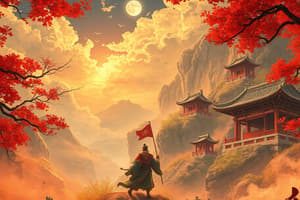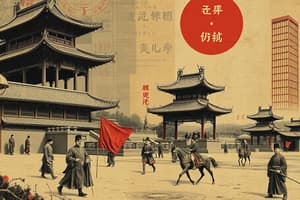Podcast
Questions and Answers
According to Zhou theory of politics, heavenly powers granted the right to govern the 'mandate of heaven' to:
According to Zhou theory of politics, heavenly powers granted the right to govern the 'mandate of heaven' to:
- The military general with the most victories
- Any member of the ruling dynasty
- The eldest son of the ruler
- An especially deserving individual known as the 'son of heaven' (correct)
What was the duty of the ruler according to Zhou theory of politics?
What was the duty of the ruler according to Zhou theory of politics?
- Governing conscientiously, observing high standards of honor and justice (correct)
- Expanding the empire through conquest
- Hoarding wealth for personal gain
- Suppressing any form of opposition ruthlessly
What would happen if a ruler failed in his duties according to Zhou theory?
What would happen if a ruler failed in his duties according to Zhou theory?
- The ruler would be celebrated as a hero
- The heavenly powers would reward him with more power
- He would be automatically granted an extension of his mandate
- Chaos and suffering would afflict his realm (correct)
How did the heavenly powers signal their disapproval of a ruler's actions in Zhou theory?
How did the heavenly powers signal their disapproval of a ruler's actions in Zhou theory?
What role did the ruler play in the cosmic balance according to Zhou theory?
What role did the ruler play in the cosmic balance according to Zhou theory?
What type of individuals might have become slaves in ancient China?
What type of individuals might have become slaves in ancient China?
How did some slave owners in ancient China maintain control over their captives?
How did some slave owners in ancient China maintain control over their captives?
What was a potential outcome for children born to enslaved parents in ancient China?
What was a potential outcome for children born to enslaved parents in ancient China?
In what ways did skilled artisans under slavery in ancient China have a chance to gain freedom?
In what ways did skilled artisans under slavery in ancient China have a chance to gain freedom?
How did Chinese lawmakers attempt to regulate slavery during certain periods of history?
How did Chinese lawmakers attempt to regulate slavery during certain periods of history?
What differentiated the prevalence of slavery in ancient China from societies like Rome?
What differentiated the prevalence of slavery in ancient China from societies like Rome?
What was one primary role of slaves in Chinese society, as mentioned in the text?
What was one primary role of slaves in Chinese society, as mentioned in the text?
How did slavery impact social mobility in ancient China?
How did slavery impact social mobility in ancient China?
What was one argument against the benefits of slavery mentioned in the text?
What was one argument against the benefits of slavery mentioned in the text?
In what way did a well-regulated system of servitude act as a safety net in ancient China?
In what way did a well-regulated system of servitude act as a safety net in ancient China?
What did critics argue about the negative aspects of slavery's economic impact?
What did critics argue about the negative aspects of slavery's economic impact?
How does understanding historical slavery in ancient China provide valuable lessons, according to the text?
How does understanding historical slavery in ancient China provide valuable lessons, according to the text?
Flashcards are hidden until you start studying




